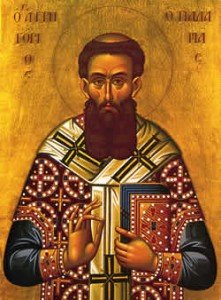I have recently been sharing with my readers the thoughts of our Father among the Saints, Gregory Palamas. It just dawned on me that many may know nothing about him. So I thought that I would, in this issue, share some information about him before I resume more of his thoughts.
The Catholic Encyclopedia describes Gregory as a Byzantine mystical theologian and defender of Hesychasm even though the Western Church has had problems with his teachings. He is one of the truly great Eastern Church saints, although his thoughts and ideas are not always easy to comprehend. He was born around 1296 in Constantinople and died in Thessalonica in 1359. You will recall that our Church remembers him on the Second Weekend of the Great Fast. Born of a well-to-do-family from Asia Minor, he received a liberal education at the imperial university and eventually entered a monastery on Mt. Athos with his two younger brothers. When the Turkish invasions of 1325 threatened the monastic life there, Gregory migrated to Thessalonica where he was ordained a priest in 1326. He returned to Mt. Athos in 1331. He was appointed the hegumen (abbot) of the Grand Laura in 1335-36 but returned after a short while to St. Sabas.
At St. Sabas he became acquainted with the theology of Barlaam, a Greek monk from Calabria who was using the syllogistic method in his attempt to refute the doc trine of the Latin Church regarding the procession of the Holy Spirit. He wrote two letters to Barlaam in which he defended the position that apodictic arguments were possible in theology and rejected the agnosticism implied in the extreme apophatic, or negative, theology of Barlaam.
Palamite doctrine on the divine nature of the light of Mt. Tabor and the visible presence of uncreated grace in the pure of heart has been totally misunderstood by Western theologians. His insistence that the whole man is engraced, body and soul, and the stress that he placed on the role of the body in prayer has been accepted by the West.
Most of his literary productions were devoted to defending his Hesychast doctrine using Greek philosophy. If you have been following this article, you are probably already aware that his ideas are complex and challenging.

